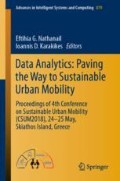Abstract
The term “business model” is associated with the “dot-com” firms and its exponential growth in late 90s, but in contemporary economics it is a transversal matter to any organization according to Osterwalder et al. (2004). There are many definitions of business model, but there is a common point in all of them: a business model is created to represent a certain service or product in order to create value to stakeholders and to be purchased by a company’s customers. The aim of the paper is to define the theoretical way for building a successful business model, which can be useful for a passenger transport company. As a result of theoretical research the authors developed recommendations for building a prototype of business model for a company, which is operating in transport industry.
Access this chapter
Tax calculation will be finalised at checkout
Purchases are for personal use only
References
Ovans, A.: What is a business model? Harv. Bus. Rev. (2015). https://hbr.org/2015/01/what-is-a-business-model. Accessed Jan 12 2018
Morris, M., Schindehutteb, M., Allen, J.: The entrepreneur’s business model: toward a unified perspective. J. Bus. Res. 58, 726–735 (2005)
Stewart, D., Zhao, Q.: Internet marketing, business models, and public policy. J. Public Policy Mark 19, 287–296 (2000)
Mayo, M., Brown, G.: Building a competitive business model. J. Ivey Bus. 63, 18–23 (1999)
Slywotzky, A.: Value Migration, pp. 15–19. Harvard Business Review Press, Boston (1996)
Teece, D.: Business models, business strategy and innovation. Long Range Plan. 43, 172–194 (2007)
Zott, C., Amit, R., Massa, L.: The business model: recent developments and future research. J. Manag. 37(4), 1019–1042 (2011)
Johnson, M.W., Christensen, C.C., Kagermann, H.: Reinventing your business model. Harv. Bus. Rev. 86(12), 50–59 (2008)
Magretta, M.: Why business models matter? Harv. Bus. Rev. (2002). https://hbr.org/2002/05/why-business-models-matter. Accessed Jan 12 2018
Osterwalder, A.: The business model ontology—a proposition in a design science approach, Dissertation 173, University of Lausanne, Switzerland (2004)
Fensel, D.: Ontologies: Silver Bullet for Knowledge Management and Electronic Commerce. Springer, Heidelberg (2001)
Mintzberg, H., Lampel, J.: Reflecting on the strategy process. Sloan Manag. Rev. 40(3), 21–30 (1999)
Learned, E.: Business Policy: Text and Cases. Irwin, Homewood, Illinois (1965)
Drucker, P.: The Practice of Management. HarperCollins Publishers, New York (1954)
Kaplan, R.S., Norton, D.P.: The balanced scorecard–measures that drive performance. Harv. Bus. Rev. 70(1) (1 992)
Osterwalder, A., Pigneur, Y., Tucci, C.L.: Clarifying business models: origins, present and future of the concept. Commun. Assoc. Inf. Sci. (CAIS) 16, 1–25 (2005)
Shafer, S., Smith, H., Linder, J.: The power of business models. Bus. Horiz. 48, 199–207 (2005)
Safarov, F.: Business Model as a Tool for a Company’s Strategic Management, Master thesis, TTI (2018)
Seddon, P.B., et al.: The case for viewing business models as abstraction of strategy. Commun. Assoc. Inf. Syst. 13, 427–442 (2004)
Acknowledgements
This work has been supported by the ALLIANCE project (http://alliance-project.eu/) and has been funded within the European Commission’s H2020 Programme under con-tract number 692426. This paper expresses the opinions of the authors and not necessarily those of the European Commission. The European Commission is not liable for any use that may be made of the information contained in this paper.
Author information
Authors and Affiliations
Corresponding author
Editor information
Editors and Affiliations
Rights and permissions
Copyright information
© 2019 Springer Nature Switzerland AG
About this paper
Cite this paper
Kuzmina-Merlino, I., Skorobogatova, O. (2019). Theoretical View on the Designing of Prototype of Business Model for a Transport Company. In: Nathanail, E., Karakikes, I. (eds) Data Analytics: Paving the Way to Sustainable Urban Mobility. CSUM 2018. Advances in Intelligent Systems and Computing, vol 879. Springer, Cham. https://doi.org/10.1007/978-3-030-02305-8_59
Download citation
DOI: https://doi.org/10.1007/978-3-030-02305-8_59
Published:
Publisher Name: Springer, Cham
Print ISBN: 978-3-030-02304-1
Online ISBN: 978-3-030-02305-8
eBook Packages: EngineeringEngineering (R0)

